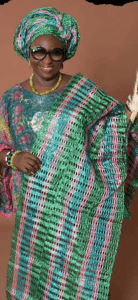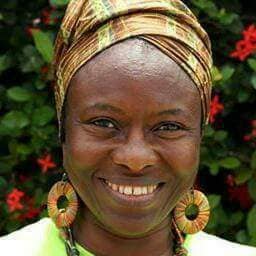She has always been an inspiration. I have been watching her and I wanted to honour her in my own way, and write a collection of children’s short stories dedicated to her. That’s how much she inspired me, from the issue of environmental stuff, child rights advocacy… we have not told her story enough. The world needs to hear, and people like this are examples that should be documented for posterity, and for people to follow…

By Godwin Okondo
FREEDOM Vibes 8.0, the eighth edition of Unchained Vibes Africa (UVA) artistic freedom series designed, according to UVA Executive Director, Mr. Ayo Ganiu, “to inspire women in driving meaningful change in the society by highlighting the Green Queen, writer, freedom of artistic expression and environmental justice advocate, Sola Alamutu, who has become a role model to many women through multiple platforms and unwavering commitment to the arts” was held to coincide with her 60th birthday celebration on May 29, 2024. And the celebration lived up to its billing as friends, associations, old schoolmates and her mentees over the years converged at Freedom park, Lagos to celebrate Alamutu with a colloquium on her art, advocacy and environmental justice.
The series was also designed to inspire women to influence societal change in their environments using Alamutu (aka Green Queen) — writer, advocate of freedom of expression and environmental justice –as role model. The colloquium had as theme, ‘Inspiring Women to Drive Social Change Through Arts’, with an all-female panel members, who had been mentees of Alamutu and had borrowed her artistic and advocacy leaf and are impacting lives in their respective spaces. They shared with the audience how the Green Queen has been an instrument of humanitarian and societal change through her work as an artist, freedom of expression advocate, and environmental justice campaigner.
The panel members included writer, performance poet, and social activist, Iquo DianaAbasi, performance and spoken word poet and culture journalist with The Nation newspaper, Evelyn Osagie, founder of Hope Inspired Foundation for Women and Youth with Disabilities (HIFWYD), Ejiro Sharon Okotie and emerging Nigerian radical environmentalist and founder of Mental and Environmental Development Initiative for Children (MEDIC), Doyinsola Ogunye. The panel session was moderated by tourism promoter and visibility strategist, Nnenna Fakoya-Smith.
These four women shared stories of their first meeting with the Green Queen, and how she has been influential in their lives in shaping their artistic and advocacy vision. According to MFA student at Alabama University, US, DianaAbasi, who joined via Zoom, “It’s been so long that I can’t remember exactly when we met. We met at the Lagos Book & Art Festival (LABAF), and I was really impressed with the way she was handling children. I became friends with her and we began to work together. Over the years, we have been interacting, and working with children. I had young children then, and that was the opportunity for my children to learn about the environment and nature. I love the fact that the children were also having creative workshops and I thought it was a very fantastic idea because I believe education doesn’t stop in the classroom.

“I feel when children are allowed to express themselves with their hands and eyes, doing arts and writing, it’s the best way for them to retain everything they’ve learned. We kept doing these things and we had tea parties with the children. I think it’s important to teach the younger generation so that as they grow older, their mindset will already be fixed from a young age. I kept working with her, and we did a lot of things with LABAF, to the point where Beach Samaritans was formed as a collaboration with WakaAbout, and I got very interested and happy to be a part of that.
“Aside working with children and doing advocacy for the environment and culture, Green Queen was also very friendly with me as a female writer back then. Whenever I had a personal problem she always gave me a listening ear and good advice as well. Some people looked at her as kind of eccentric back then. She would put on earrings made out of bottle covers, and she was always looking cool in it. I realized it was just an expression of what she does. We had green parties where we learned about nutrition that were not too good for our bodies, and how to improve our lifestyle and health. This is just how we kept growing and I imbibed a lot of these good things I learned from her.”
Osagie said she met Alamutu’s work before she actually met her in person, adding, “I was always at places like LABAF, where she was always hosting events for children, and I was particularly interested in anything happening for children because I feel that we need to impact the next generation, because some of us came from where we’ve had opportunities with people like Green Queen supporting us in our young age and helping us find our passion, and with that came purpose, and it’s what is feeding us today.
“I have never forgotten the first time I met her. We were actually introduced by Uncle Jahman Anikulapo, Chair for Committee for Relevant Art (CORA), who’s a mentor to all of us. I just came from Benin City as a greenhorn and my blood was hot. So, in one of those Nigeria Prize for Literature events, sponsored by Nigeria LNG at Eko Hotel, Jahman was introducing me to everyone, and he said, ‘there’s a woman I want you to meet. She’s just like you and she might inspire you a lot.’ So, he brought her and said, ‘come and see this girl. She’s always looking for trouble,’ and she said, ‘I know you, and I don’t like you.’ I was asking why she didn’t like me, because she was someone I was trying to impress, and she said, ‘you remind me of me!’
“I didn’t know her then, but by the way she spoke, I felt like I had offended the gods, and the next moment, she was asking me to do some things for her. And I was wondering, ‘what kind of woman is this? You already said you don’t like me.’ I had already raised my guard up and said, ‘I won’t like you, too.’ Along the way, she has inspired me through all that she does. We were just doing art, and the way we were taught, art mirrors society and addresses different issues, and I see her do a lot of that.
“She has always been an inspiration. I have been watching her and I wanted to honour her in my own way and write a collection of children’s short stories dedicated to her. That’s how much she inspired me, from the issue of environmental stuff, child rights advocacy, and all of that. I try to do that as an artist and journalist, but we have not told her story enough. The world needs to hear, and people like this are examples that should be documented for posterity, and for people to follow. I don’t know where she finds the strength and energy to do so much and when she takes you on, you think you’re the only person she has under her wings, and you don’t know that there are hundreds of us.”
According to Okotie, “I fondly call her senior Sola. We are old girls of Queens College and I am their youngest because I finished with the 2003 set. I met her in 2016 through her class group of 1979. So, I was at home that day and Aunty Abigail, the resource teacher for the visually impaired students at Queens College, called to inform me of a programme they were having, and they wanted me to come. And, I did and was given a recognition award by the class of 1979 for the work that I was doing, building the lives of development for the girls at Queens College at the time.
“We have a 5-day camp in December and we just bring these girls together in the same space to encourage them, and given that Queens College is my alma mater, I decided to start from there. From my own personal experience, young people with disabilities do not really step out, especially young women, and I identify those gaps, and that’s one of the things that spurred me to begin to do some of the work I do. The class of 1979 and senior Sola personally bought into it. We sent her invitations to those camp events, and even if nobody from the class of ‘79 showed up, she was always present. She supported us in so many ways – morally and ensuring these girls also find purpose.
“I think a major thing that stood out for me was the Lagos Book and Art Festival, and one of things I said to her was, ‘you are bringing all of these to them, but what about students with disabilities?’ In one of the editions, students from Queens College came, and there was a cooking competition, and the visually impaired students also participated. Senior Sola is very intentional, so she does all this work and she makes sure every single person is able to participate and benefit, and I’m glad there is an opportunity like this to celebrate her.”
Ogunye noted that she couldn’t remember her childhood without Aunty Sola and all the Alamutus being a part of it, adding, “My first recollection of how we started to work together, my first job was actually with her organisation Children and the Environment (CATE), and I think I was about 15-16, and I just got out of secondary school and I was looking for a job to keep me busy before university and I started working with Aunty Sola. I remember it was in Victoria Island and it was tough. Everyone knows Aunty Sola is a perfectionist when it comes to environmental work, and I still remember some of the early things she instilled in me, which are things I still do till now.
“There was a particular day, she sent me to a fast food place to buy food, and she asked me to take coolers because she didn’t want takeaway packs, and this happened when I was 16, and she instilled that in me. Today, I don’t buy food in takeaway packs. This year, the Lagos State Government banned Styrofoam packs; surprising that people are now doing what Aunty Sola started a long time ago.
“I think that’s how my passion for the environment started, because I started doing some environmental work in 2009 or thereabout, and that was after I started working with her. So, I would say that working with her ignited that passion in me to do what I’m doing now. Right after that, we started to work on something called the Beach Samaritans. I would say that there is nobody that knows me and my work that doesn’t know how Aunty has supported my work, and also being a strong influence in my life. So, I want to really appreciate her. Thank you so much for being a very strong influence in my life today.”
Celebrating Alamutu @60 as Freedom Vibes 8.0 spotlights women driving social change





